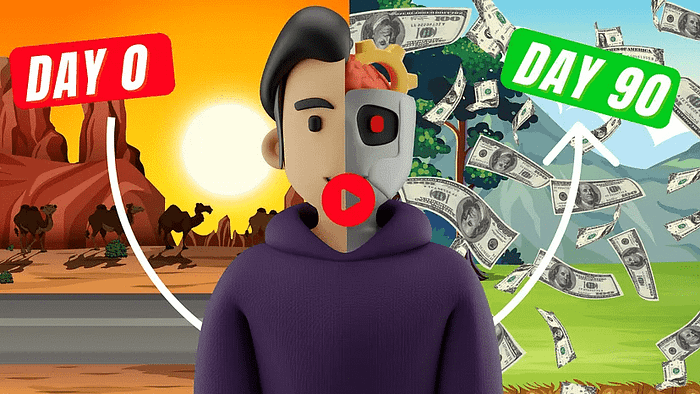Starting a Million-Dollar AI Lead Generation Agency: The Ultimate Guide for 2025
Building a successful lead generation agency requires masterful integration of artificial intelligence with proven marketing strategies. As businesses increasingly seek automated solutions for customer acquisition, the opportunity to build a thriving lead generation agency has never been more promising. This comprehensive guide unveils the exact blueprint for creating and scaling a seven-figure agency that harnesses the power of AI to deliver exceptional results.
We strongly recommend that you check out our guide on how to take advantage of AI in today’s passive income economy.
Table of Contents
Understanding the AI Lead Generation Landscape
The artificial intelligence revolution has fundamentally transformed how businesses acquire and convert customers. Modern lead generation agency owners must navigate this rapidly evolving landscape while delivering consistent results for their clients. The global AI market shows unprecedented momentum, with projections indicating a remarkable 38.1% growth rate between 2024 and 2030. This explosive growth creates massive opportunities for agency owners who position themselves at the forefront of this technological revolution.
Success in this space requires deep understanding of both traditional marketing principles and cutting-edge AI applications. The most successful lead generation agency operators combine these elements to create powerful, scalable solutions that drive real business growth for their clients. This hybrid approach enables agencies to command premium rates while delivering superior results through automation and optimization.
The Core Service Offering
A modern lead generation agency provides comprehensive lead generation and appointment setting services enhanced by sophisticated AI systems. This goes far beyond traditional marketing approaches, incorporating advanced automation at every stage of the customer journey. The service typically encompasses strategic paid advertising across multiple platforms, intelligent lead nurturing sequences, and AI-powered systems that streamline the entire sales process.
The financial model for a lead generation agency typically starts with monthly retainers ranging from $1,000 to $10,000+. As agencies build their portfolio and reputation, some command premium rates exceeding $50,000 per client. New agency owners generally begin at the $1,000 level, focusing initially on building impressive case studies and testimonials that demonstrate their capability to deliver results.
This pricing structure reflects the tremendous value that effective lead generation delivers to businesses. A well-executed AI lead generation system can transform a client’s business, making the monthly investment highly profitable for both parties. The key lies in creating systems that consistently deliver measurable results while scaling efficiently through automation.
Foundation: The Three Pillars of Agency Success
The foundation of every successful lead generation agency rests on three crucial pillars: client acquisition, conversion, and results delivery. Each pillar requires careful attention and systematic optimization to create a sustainable and profitable agency model.
Client Acquisition Strategy
The first critical element for any lead generation agency is developing a systematic approach to finding and attracting ideal clients. This process begins with clear identification of target markets that offer the greatest potential for success. The ideal clients for a lead generation agency typically share several key characteristics that make them excellent long-term partners.
Successful agencies focus on businesses with high market demand from a large customer base. These businesses must have the potential for consistent repeat business, as this creates opportunities for long-term value creation. Initially, targeting local businesses provides several advantages, including easier relationship building and the ability to leverage local market knowledge.
The most effective agency owners develop deep expertise in specific verticals while maintaining the flexibility to serve various business types. This approach allows for the development of specialized knowledge and systems while maintaining diverse revenue streams. Understanding the unique challenges and opportunities within each market segment enables agencies to deliver more targeted and effective solutions.
Client Conversion Process
Converting prospects into paying clients requires a refined sales methodology that consistently demonstrates value while addressing common objections. The Conversational Problem Solving (CPS) framework provides a structured approach that guides prospects through a natural discovery and decision-making process.
The attention phase focuses on building genuine rapport while establishing authority in the space. This requires careful balance between demonstrating expertise and maintaining an approachable, consultative stance. The identification phase involves deep discovery of prospect pain points and desired outcomes, creating the foundation for a tailored solution presentation.
During the solution phase, agencies present their tailored approach while highlighting specific ways their AI-powered systems will address the prospect’s unique challenges. The closing phase focuses on securing commitment and establishing clear next steps, ensuring smooth transition into the onboarding process.
Results Delivery System
A successful lead generation agency must develop robust systems for consistently delivering measurable results to clients. This requires careful integration of various technologies and processes to create reliable, scalable solutions. The foundation of effective results delivery lies in creating systematic approaches that can be replicated and optimized over time.
Strategic paid advertising campaigns form the core of many agency offerings, requiring deep expertise in platform-specific optimization techniques. AI-powered lead qualification systems ensure that only the most promising prospects receive attention, maximizing resource efficiency. Automated appointment setting systems streamline the conversion process while maintaining high touch points through intelligent automation.
Advanced customer journey optimization involves continuous refinement of each touchpoint, ensuring maximum conversion rates throughout the process. This requires sophisticated tracking and analysis systems that provide actionable insights for ongoing improvement.
The AI Lead Generation Funnel
The core of every successful lead generation agency lies in its ability to create and optimize sophisticated marketing funnels powered by artificial intelligence. This system represents a carefully orchestrated journey that transforms cold prospects into qualified leads and ultimately into paying customers for clients.
Stage 1: Interest Generation
The process begins with strategic interest generation through carefully targeted advertising campaigns. A proficient lead generation agency must master the intricacies of major advertising platforms, particularly Meta (Facebook/Instagram) and Google Ads. These platforms offer unprecedented targeting capabilities when combined with AI-driven optimization tools.
Creating compelling offers requires deep understanding of market psychology and customer behavior patterns. The most successful agencies develop frameworks for rapidly identifying and testing offers that resonate with specific market segments. This process involves continuous refinement based on real-time performance data and AI-driven insights.
Platform selection plays a crucial role in campaign success. While Meta’s platforms excel at B2C targeting with rich demographic data, Google Ads often proves more effective for B2B clients or high-intent purchases. Understanding these nuances enables lead generation agency owners to allocate resources more effectively across different channels.
Stage 2: Lead Capture
The lead capture phase requires sophisticated systems that maximize conversion rates while ensuring lead quality. Modern lead generation agency operations leverage advanced tools like Go High Level for CRM and automation, complemented by specialized AI tools for lead qualification and nurturing.
Implementation of these systems requires careful attention to user experience and conversion optimization. Every step in the lead capture process must be meticulously designed to reduce friction while maintaining sufficient qualification criteria. This balance ensures that clients receive qualified leads rather than just high volumes of unqualified prospects.
The integration of AI-powered chatbots and automated qualification systems has revolutionized the lead capture process. These systems can engage prospects 24/7, qualifying leads based on sophisticated criteria while maintaining a personalized experience. This automation enables lead generation agency owners to scale their operations without proportionally increasing overhead costs.
Stage 3: Conversion Optimization
The conversion optimization phase represents the crucial bridge between lead generation and client revenue. This stage requires sophisticated automation systems combined with human oversight to ensure optimal results. A lead generation agency must develop robust systems for monitoring and optimizing every step of the conversion process.
Advanced AI tools enable unprecedented levels of personalization in follow-up sequences. These systems analyze prospect behavior patterns to determine optimal timing and messaging for follow-up communications. The result is higher conversion rates and improved client satisfaction through more relevant, timely interactions.
Appointment scheduling automation has become increasingly sophisticated, with AI systems capable of managing complex calendaring requirements while maintaining a natural conversation flow. These systems reduce the administrative burden on clients while improving the prospect experience through immediate scheduling confirmation and automated reminders.
Maximizing Client Lifetime Value
Success as a lead generation agency depends heavily on the ability to maximize client lifetime value through strategic service delivery and continuous optimization. This requires careful attention to both immediate results and long-term relationship building.
The Value Ladder Strategy
Implementation of an effective value ladder strategy enables lead generation agency clients to maximize revenue from each customer relationship. This approach begins with carefully designed entry-level offers that acquire customers at an acceptable cost while setting the stage for future purchases.
Strategic upsell pathways must be designed based on detailed customer behavior analysis and market research. The most successful lead generation agency operators help clients develop sophisticated upsell sequences that feel natural and beneficial to customers rather than pushy or sales-driven.
High-ticket service promotion requires particularly careful attention to timing and messaging. AI systems can help identify optimal moments for introducing premium offerings based on customer behavior patterns and engagement metrics. This data-driven approach significantly improves conversion rates for higher-priced services.
Implementation of AI Systems
Modern lead generation agency operations must leverage cutting-edge AI tools throughout their service delivery. This includes sophisticated sales process automation that handles routine tasks while identifying opportunities for human intervention at crucial decision points.
Customer service optimization through AI enables rapid response to common queries while ensuring consistent messaging across all touchpoints. These systems can handle increasing volumes of customer interactions without degrading service quality, enabling scalable growth for both the agency and its clients.
Operations streamlining through AI automation reduces overhead costs while improving service consistency. Advanced systems can manage complex workflows, ensure compliance with established processes, and identify opportunities for optimization based on performance data.
Future Trends and Opportunities
The lead generation agency landscape continues to evolve rapidly, driven by technological advancements and changing market dynamics. Understanding and preparing for emerging trends enables agency owners to maintain competitive advantages while delivering increasing value to clients.
Emerging Technologies
Generative AI represents a revolutionary force in content creation and creative development. Advanced systems can now produce highly personalized marketing materials at scale, enabling lead generation agency owners to deliver more sophisticated campaigns while maintaining efficiency. These tools continuously improve, offering increasingly natural and engaging content that resonates with target audiences.
AI sales agents have evolved beyond basic chatbots into sophisticated systems capable of handling complex conversations and objection handling. These systems learn from each interaction, continuously improving their ability to engage prospects effectively. Leading lead generation agency operators integrate these tools throughout their service delivery, enabling 24/7 prospect engagement while maintaining high conversion rates.
Automated employee systems represent the next frontier in agency operations. These sophisticated AI tools can handle increasingly complex tasks, from campaign optimization to client reporting. The integration of these systems enables lead generation agency owners to scale their operations more efficiently while maintaining service quality.
Extended reality (XR) applications are revolutionizing how businesses engage with prospects. Forward-thinking lead generation agency owners are already exploring ways to leverage these technologies for immersive marketing experiences. The convergence of AI and XR creates unprecedented opportunities for innovative customer engagement strategies.
Market Evolution
The lead generation agency model continues to evolve, driven by increasing AI sophistication and changing client expectations. Successful agencies must adapt their service offerings to incorporate emerging technologies while maintaining focus on delivering measurable results.
Enhanced automation capabilities enable agencies to handle larger client portfolios without proportional increases in overhead costs. This scalability creates opportunities for rapid growth while maintaining profitability. Leading lead generation agency operators continuously refine their automation systems to improve efficiency and effectiveness.
Improved conversion technologies enable more sophisticated tracking and optimization of the entire customer journey. Advanced analytics provide deeper insights into prospect behavior, enabling more targeted and effective marketing strategies. These capabilities help agencies demonstrate clear ROI to clients while identifying opportunities for service improvement.
Building Your Agency Foundation
Creating a sustainable lead generation agency requires careful attention to foundational elements that enable consistent service delivery and scalable growth. This foundation must support both current operations and future expansion plans.
Essential Tools and Systems
Modern lead generation agency operations require sophisticated technology stacks that enable efficient service delivery while maintaining scalability. The core technology infrastructure must support both current operations and future growth while ensuring consistent service quality.
CRM and automation platforms form the backbone of agency operations, enabling efficient management of client relationships and campaign execution. These systems must integrate seamlessly with other tools while providing the flexibility to adapt to changing requirements. Successful lead generation agency owners carefully evaluate and select platforms that align with their service delivery models.
AI-powered communication tools enable sophisticated prospect engagement while maintaining personalization at scale. These systems must balance automation with human oversight, ensuring optimal results while maintaining brand consistency. Integration of these tools requires careful attention to workflow design and team training.
Team Structure
Developing an effective team structure represents a crucial challenge for growing lead generation agency operations. The organizational design must support efficient service delivery while enabling continuous improvement and innovation.
Core service delivery teams require careful balance between technical expertise and client communication skills. These teams must understand both the technological capabilities of AI systems and the practical needs of clients. Successful lead generation agency owners invest heavily in team development and training.
Client success managers play crucial roles in maintaining strong client relationships while identifying opportunities for service expansion. These team members must possess both technical understanding and strong communication skills. Their ability to translate technical capabilities into business benefits helps maintain strong client relationships.
Scaling to Seven Figures
Achieving seven-figure revenue requires systematic approach to growth while maintaining service quality. Successful lead generation agency owners focus on both revenue expansion and operational efficiency.
Revenue Optimization
High-value client acquisition requires sophisticated targeting and qualification processes. Leading agencies develop detailed ideal client profiles and systematic approaches to identifying and converting premium prospects. This focus on quality over quantity enables higher retainers and longer client relationships.
Service package optimization involves continuous refinement based on client results and market demands. Successful lead generation agency operators regularly evaluate their service offerings, adjusting pricing and deliverables to maximize value for both clients and the agency.
Operational efficiency becomes increasingly crucial as agencies scale. Advanced systems enable efficient service delivery while maintaining quality standards. This efficiency enables agencies to maintain profitability while expanding their client base.
Systems and Processes
Documentation and optimization of core processes enable consistent service delivery while supporting team growth. Successful lead generation agency operations maintain detailed documentation of all critical procedures, enabling efficient onboarding and training of new team members.
Quality control measures ensure consistent service delivery across all clients. These systems must balance automation with human oversight, ensuring optimal results while maintaining scalability. Regular review and refinement of these processes enables continuous improvement in service delivery.
Measuring Success and Growth
Success in the lead generation agency space requires sophisticated approaches to performance measurement and strategic growth planning. Establishing clear metrics and monitoring systems enables data-driven decision making while ensuring alignment with long-term objectives.
Key Performance Indicators
Client acquisition cost represents a crucial metric for sustainable agency growth. Successful lead generation agency owners carefully track all expenses associated with acquiring new clients, including marketing costs, sales team time, and onboarding resources. This comprehensive view enables optimization of acquisition strategies while maintaining profitable growth rates.
Customer lifetime value calculations must consider both direct revenue and indirect benefits such as referrals and case studies. Leading agencies develop sophisticated models for projecting and optimizing client value over time. These projections inform decisions about service delivery investments and resource allocation.
Monthly recurring revenue provides the foundation for sustainable agency growth. Tracking this metric requires attention to both gross and net retention rates, as client churn can significantly impact long-term success. Successful lead generation agency operators focus on maintaining high retention rates through consistent service delivery and proactive client management.
Client satisfaction scores offer crucial insights into service quality and potential retention issues. Regular monitoring of these metrics enables early identification of potential problems while highlighting opportunities for service improvement. Leading agencies implement systematic approaches to gathering and acting on client feedback.
Advanced Analytics and Optimization
Campaign performance analytics require sophisticated tracking systems that monitor multiple metrics across various platforms. Successful lead generation agency owners develop comprehensive dashboards that provide real-time insights into campaign performance. These systems enable rapid optimization while demonstrating clear ROI to clients.
Conversion rate optimization becomes increasingly crucial as agencies scale their operations. Advanced testing methodologies enable continuous improvement in campaign performance. Leading agencies implement systematic approaches to testing and optimization across all aspects of their service delivery.
Return on ad spend (ROAS) tracking requires careful attention to both direct and indirect conversion metrics. Sophisticated attribution models enable accurate assessment of campaign effectiveness. Successful lead generation agency operators develop detailed understanding of how different channels contribute to overall client success.
Strategic Growth Planning
Market expansion strategies must balance opportunity with operational capability. Successful lead generation agency owners carefully evaluate new market opportunities while ensuring their operations can support expansion. This strategic approach enables sustainable growth while maintaining service quality.
Service diversification decisions require careful analysis of market demand and operational requirements. Leading agencies develop systematic approaches to evaluating and implementing new service offerings. This process includes detailed assessment of resource requirements and potential return on investment.
Team expansion planning must align with projected growth while maintaining operational efficiency. Successful lead generation agency operations develop detailed hiring and training plans that support strategic objectives. This proactive approach ensures adequate resources for growth while maintaining service quality.
Conclusion: Building a Sustainable Seven-Figure Agency
Creating a successful lead generation agency requires careful attention to multiple factors while maintaining focus on delivering consistent client results. This comprehensive approach enables sustainable growth while building long-term value.
Critical Success Factors
Technology integration represents a crucial element of agency success. Leading lead generation agency owners continuously evaluate and implement new tools that enhance service delivery. This focus on technological advancement enables increased efficiency while improving client results.
Team development requires systematic approaches to hiring, training, and retention. Successful agencies create environments that support both individual growth and operational excellence. This investment in human capital enables consistent service delivery while supporting sustainable growth.
Client relationship management becomes increasingly crucial as agencies scale. Sophisticated systems enable proactive management of client relationships while identifying opportunities for service expansion. Leading lead generation agency operators develop systematic approaches to maintaining strong client relationships.
Future Outlook
The lead generation agency industry continues evolving, driven by technological advancement and changing market demands. Success requires continuous adaptation while maintaining focus on delivering measurable client results. Future opportunities will emerge from continued innovation in AI and related technologies.
Market maturation will likely drive increased specialization among agencies. Successful lead generation agency owners will develop deep expertise in specific verticals while maintaining operational efficiency. This specialization enables premium pricing while supporting strong client relationships.
Technological advancement will continue creating new opportunities for service innovation. Leading agencies will maintain competitive advantages through early adoption of emerging technologies. This focus on innovation enables continuous improvement in service delivery while maintaining market leadership.
The path to building a seven-figure lead generation agency requires dedication, strategic thinking, and systematic execution. Success demands continuous learning and adaptation while maintaining focus on delivering exceptional client results. By following these principles and maintaining commitment to excellence, agency owners can build sustainable businesses that generate significant value for both clients and stakeholders.

We strongly recommend that you check out our guide on how to take advantage of AI in today’s passive income economy.




